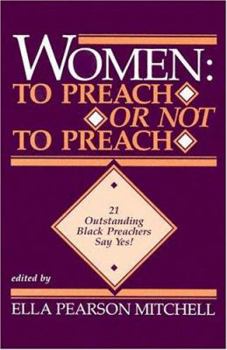Women: To Preach or Not to Preach: 21 Outstanding Black Preachers Say Yes!
Select Format
Select Condition 
Book Overview
No Synopsis Available.
Format:Paperback
Language:English
ISBN:0817011692
ISBN13:9780817011697
Release Date:January 1991
Publisher:Judson Press
Length:145 Pages
Weight:0.45 lbs.
Dimensions:0.5" x 5.5" x 8.5"
Customer Reviews
1 rating
Amen!
Published by Thriftbooks.com User , 21 years ago
'My beloved, the establishment may not be ready, but God is!' (Mitchell, p. 39) Reading 'Women: To Preach or Not to Preach - 21 Outstanding Black Preachers Say Yes!' was a very rewarding experience. Within this book, there are names familiar to me, and names new to me. The opening essay sets a framework for theological and historical reflection. The Mitchells have a regard for the authority of the biblical text similar to my own. 'Given this final biblical revelation, it is to be understood that God still speaks to individuals, an our prayerful interpretation of the changeless Word can still improve.' (p. 3) God has not spoken the final word on creation. The Mitchells also illustrate historical/textual points often forgotten or neglected by patriarchal authorities, such as the example of Huldah. 'When a woman is rated over the high priest in judging crucial spiritual matters, it has to be obvious that God places no limitations on what a woman can do.' (p. 8) My only concern with the essay would be a brief flirtation with supersessionism in the discussion on the theology of gifts. Getting into the sermons by the women in this volume, there is a power and vitality that leaps off the page. They address in a number of ways the concerns women have toward their own role, and how society sees them. What they seem to have in great uniformity, however, is the certainty of a call from God for the role they occupy. Mitchell asks a basic question: 'Whom does God choose for the preaching of the gospel? Just how does God go about selecting those who are to bring the precedent-shattering Good News?' (Mitchell, p. 37) She concludes that the temporary societal structures of the church are not divine by any means. 'God does not pay any attention to the way we determine who should be called to preach or serve, and God never has.' (Mitchell, p. 38) God will call whomever God chooses. McKenzie seconds this with her example from the Hebrew Scriptures: '[Deborah] being a prophetess and a judge was not dependent upon the whims and fancies of her society, but upon the call of God. There is strength in knowing your job and doing it.' (McKenzie, p. 73) Many speak of great power in the example of Jesus and the way he acted with regard to all people. 'Jesus, then, was about the task of infusing women with the spiritual strength and confidence of believing in themselves as equal children under God.' (Hale, p. 91) Jesus was not one to 'go along to get along', but rather one who risked everything for the greater good of all. This is what women are called to do, also. 'Risking it all will mean that women will have the audacity to preach when some who presume to know the mind of God declare that they can't.' (Grant, p. 108) The structures of society work to keep women from pursuing their callings. Some are direct obstructions, but some are more subtle, and lead to women not making the effort required (which is usually an extra effort). Bishop Barbara Harris spoke of this in relat




